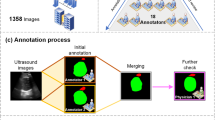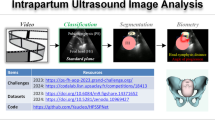Abstract
Pubic symphysis-fetal head segmentation in transperineal ultrasound images plays a critical role for the assessment of fetal head descent and progression. Existing transformer segmentation methods based on sparse attention mechanism use handcrafted static patterns, which leads to great differences in terms of segmentation performance on specific datasets. To address this issue, we introduce a dynamic, query-aware sparse attention mechanism for ultrasound image segmentation. Specifically, we propose a novel method, named BRAU-Net to solve the pubic symphysis-fetal head segmentation task in this paper. The method adopts a U-Net-like encoder-decoder architecture with bi-level routing attention and skip connections, which effectively learns local-global semantic information. In addition, we propose an inverted bottleneck patch expanding (IBPE) module to reduce information loss while performing up-sampling operations. The proposed BRAU-Net is evaluated on FH-PS-AoP and HC18 datasets. The results demonstrate that our method could achieve excellent segmentation results. The code is available on GitHub.
Access this chapter
Tax calculation will be finalised at checkout
Purchases are for personal use only
Similar content being viewed by others
References
Fitzpatrick, M., McQuillan, K., O’Herlihy, C.: Influence of persistent occiput posterior position on delivery outcome. Obstetr. Gynecol. 98(6), 1027–1031 (2001)
Simkin, P.: The fetal occiput posterior position: state of the science and a new perspective. Birth 37(1), 61–71 (2010)
Sherer, D.M., Bradley, K.S., Langer, O.: Intrapartum fetal head position i: comparison between transvaginal digital examination and transabdominal ultrasound assessment during the active stage of labor. Ultrasound Obstet. Gynecol. 19(3), 258–263 (2002)
Long, J., Shelhamer, E., Darrell, T.: Fully convolutional networks for semantic segmentation. In: Proceedings of the IEEE Conference on Computer Vision and Pattern Recognition, pp. 3431–3440 (2015)
Ronneberger, O., Fischer, P., Brox, T.: U-net: convolutional networks for biomedical image segmentation. In: Navab, N., Hornegger, J., Wells, W.M., Frangi, A.F. (eds.) MICCAI 2015. LNCS, vol. 9351, pp. 234–241. Springer, Cham (2015). https://doi.org/10.1007/978-3-319-24574-4_28
Oktay, O., et al.: Attention u-net: learning where to look for the pancreas. arXiv preprint arXiv:1804.03999 (2018)
Yaosheng, L., et al.: Multitask deep neural network for the fully automatic measurement of the angle of progression. Comput. Math. Methods Med. 2022(1), 5192338 (2022)
Bai, J., et al.: A framework for computing angle of progression from transperineal ultrasound images for evaluating fetal head descent using a novel double branch network. Front. Physiol. 13, 940150 (2022)
Vaswani, A., et al.: Attention is all you need. In: Advances in Neural Information Processing Systems. vol. 30 (2017)
Chen, J., et al.: Transunet: transformers make strong encoders for medical image segmentation. arXiv preprint arXiv:2102.04306 (2021)
Zhang, Y., Liu, H., Hu, Q.: TransFuse: fusing transformers and CNNs for medical image segmentation. In: de Bruijne, M., et al. (eds.) MICCAI 2021, Part I. LNCS, vol. 12901, pp. 14–24. Springer, Cham (2021). https://doi.org/10.1007/978-3-030-87193-2_2
Heidari, M., et al.: Hiformer: hierarchical multi-scale representations using transformers for medical image segmentation. In: Proceedings of the IEEE/CVF Winter Conference on Applications of Computer Vision, pp. 6202–6212 (2023)
Azad, R., Heidari, M., Yuli, W., Merhof, D.: Contextual attention network: transformer meets U-net. In: Lian, C., Cao, X., Rekik, I., Xu, X., Cui, Z. (eds.) MLMI 2022. LNCS, vol. 13583, pp. 377–386. Springer, Cham (2022). https://doi.org/10.1007/978-3-031-21014-3_39
Cao, H., et al.: Swin-Unet: Unet-like pure transformer for medical image segmentation. In: Karlinsky, L., Michaeli, T., Nishino, K. (eds.) ECCV 2022. LNCS, vol. 13803, pp. 205–218. Springer, Cham (2022). https://doi.org/10.1007/978-3-031-25066-8_9
Liu, Z., et al.: Swin transformer: hierarchical vision transformer using shifted windows. In: Proceedings of the IEEE/CVF International Conference on Computer Vision, pp. 10012–10022 (2021)
Valanarasu, J.M.J., Oza, P., Hacihaliloglu, I., Patel, V.M.: Medical transformer: gated axial-attention for medical image segmentation. In: de Bruijne, M., et al. (eds.) MICCAI 2021. LNCS, vol. 12901, pp. 36–46. Springer, Cham (2021). https://doi.org/10.1007/978-3-030-87193-2_4
Zhu, L., Wang, X., Ke, Z., Zhang, W., Lau, R.W.H.: Biformer: vision transformer with bi-level routing attention. In: Proceedings of the IEEE/CVF Conference on Computer Vision and Pattern Recognition, pp. 10323–10333 (2023)
Chen, G., Li, L., Zhang, J., Dai, Yu.: Rethinking the unpretentious u-net for medical ultrasound image segmentation. Pattern Recogn. 142, 109728 (2023)
Ning, Z., Zhong, S., Feng, Q., Chen, W., Zhang, Yu.: SMU-net: saliency-guided morphology-aware u-net for breast lesion segmentation in ultrasound image. IEEE Trans. Med. Imaging 41(2), 476–490 (2021)
Chen, Z., Zhanhong, O., Yaosheng, L., Bai, J.: Direction-guided and multi-scale feature screening for fetal head-pubic symphysis segmentation and angle of progression calculation. Expert Syst. Appl. 245, 123096 (2024)
Sandler, M., Howard, A., Zhu, M., Zhmoginov, A., Chen, L.-C.: Mobilenetv2: inverted residuals and linear bottlenecks. In: Proceedings of the IEEE Conference on Computer Vision and Pattern Recognition, pp. 4510–4520 (2018)
Yaosheng, L., et al.: The JNU-IFM dataset for segmenting pubic symphysis-fetal head. Data Brief 41, 107904 (2022)
Bai, J., et al.: PSFHS challenge report: pubic symphysis and fetal head segmentation from intrapartum ultrasound images. Med. Image Anal. 103353 (2024)
van den Heuvel, T.L.A., de Bruijn, D., de Korte, C.L., van Ginneken, B.: Automated measurement of fetal head circumference using 2d ultrasound images. PLoS One 13(8), e0200412 (2018)
Chen, B., Liu, Y., Zhang, Z., Lu, G., Kong, A.W.K.: TransAttUnet: multi-level attention-guided u-net with transformer for medical image segmentation. IEEE Trans. Emerg. Top. Comput. Intell. (2023)
Selvaraju, R.R., Cogswell, M., Das, A., Vedantam, R., Parikh, D., Batra, D.: Grad-CAM: visual explanations from deep networks via gradient-based localization. In: Proceedings of the IEEE International Conference on Computer Vision, pp. 618–626 (2017)
Acknowledgments
This work is supported in part by the Scientific Research Foundation of Chongqing University of Technology under Grants 0103210650 and 0121230235, and in part by the Youth Project of Science and Technology Research Program of Chongqing Education Commission of China under Grants KJQN202301145 and KJQN202301162. We would like to thank the anonymous reviewers for their helpful comments which have led to many improvements in this paper.
Author information
Authors and Affiliations
Corresponding author
Editor information
Editors and Affiliations
Rights and permissions
Copyright information
© 2025 The Author(s), under exclusive license to Springer Nature Singapore Pte Ltd.
About this paper
Cite this paper
Cai, P., Jiang, L., Li, Y., Liu, X., Lan, L. (2025). Pubic Symphysis-Fetal Head Segmentation Network Using BiFormer Attention Mechanism and Multipath Dilated Convolution. In: Ide, I., et al. MultiMedia Modeling. MMM 2025. Lecture Notes in Computer Science, vol 15522. Springer, Singapore. https://doi.org/10.1007/978-981-96-2064-7_18
Download citation
DOI: https://doi.org/10.1007/978-981-96-2064-7_18
Published:
Publisher Name: Springer, Singapore
Print ISBN: 978-981-96-2063-0
Online ISBN: 978-981-96-2064-7
eBook Packages: Computer ScienceComputer Science (R0)




